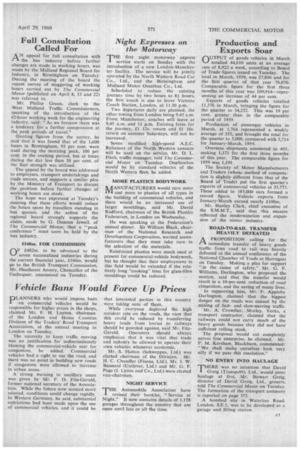Production and Exports Soar
Page 39

If you've noticed an error in this article please click here to report it so we can fix it.
OUTPUT of goods vehicles in March totalled 44,610 units at an average rate of 8,922 a week, according to Board of Trade figures issued on Tuesday. The total in March, 1959, was 27,896 and for the first quarter of that year 76,070. Comparable figure for the first three months of this year was 109,914—representing an increase of 44 per cent.
Exports of goods vehicles totalled 11,376 in March, bringing the figure for the quarter to 34,232. This was 19 per cent. greater than in the comparable period of 1959.
Production of passenger vehicles in March, at 1,764 represented a weekly average of 353, and brought the total for the quarter to 5,000, compared with 3,714 for January-March, 1959.
Overseas shipments amounted to 491, making 1,371 for the first three months of this year. The comparable figure for 1959 was 1,191.
The Society of Motor Manufacturers and Traders (whose method of computation is slightly different from that of the Board of Trade) put the first quarter's exports of commercial vehicles at 35,773. These added to 185,000 cars formed a record figure. Vehicle exports from January-March earned nearly £100m.
Mr. Stanley Clark, chief executive of the S.M.M.T., said that this success reflected the modernization and expansion of the motor industry.
ROAD-TO-RAIL TRANSFER HEAVILY DEFEATED
A PROPOSITION calling for the I-1 immediate transfer of heavy goods traffic from road to rail was heavily defeated at the annual conference of the National chamber of Trade at Harrogate on Tuesday. Making a plea for support "in the cause of safety," Mr. G. F. Williams, Darlington, who proposed the motion, said that the transfer would result in a 10-per-cent, reduction of road congestion, and the saving of many lives.
In supporting him, Mr. F. Appleby Darlington, claimed that the biggest danger on the roads was caused by the mixing of fastand slow-moving traffic.
Mr. A. Crowther, Morley, Yorks, a transport contractor, claimed that the railways could not carry much of the heavy goods because they did not have sufficient rolling stock.
The proposal would cut completely across free enterprise, he claimed. Mr. F. M. Kershaw, Blackburn, commented: "We shall make ourselves look very silly if we pass this resolution."
NO ENTRY INTO HAULAGE
THERE was no intention that David Greig (Transpart), Ltd., would enter haulage at first, Mr. Stewart Greig, director of David Greig, Ltd., grocers, told The Commercial Motor on Tuesday. The formation of the transport company is reported on page 372.
A bombed site in Waterloo Road, London, S.E.1, was to be developed as a garage and filling station.












































































































